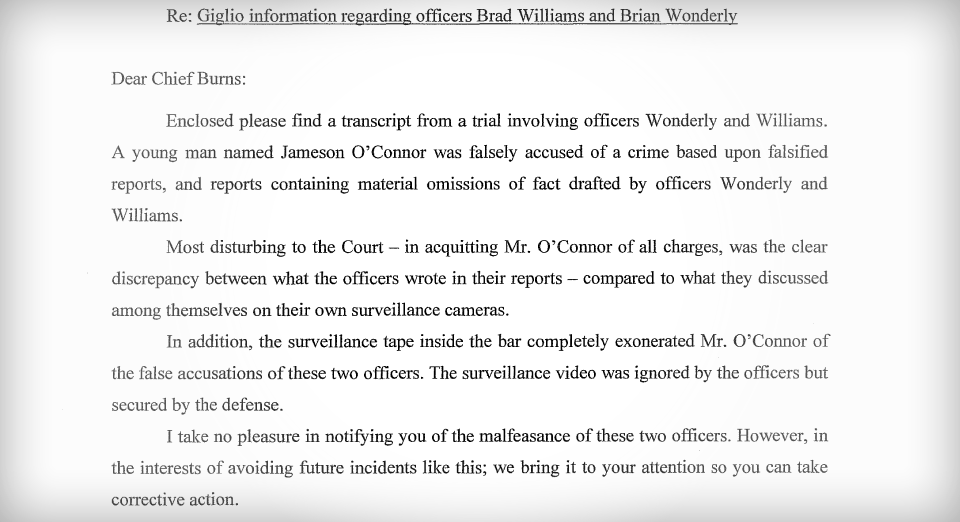Judge: Letter that alleges false statements by Lawrence police officer should’ve been given to defense attorney

Related articles: Duc M. Tran's case — Part 1 | Part 2 | Part 3 | Part 4 | Part 5 | Part 6
A judge said Monday that a prosecutor should have notified defense counsel about a letter alleging that a Lawrence police officer previously wrote a false report and omitted key facts.
However, the judge tentatively denied a motion to dismiss the pending case on grounds of previous dishonesty by the officer, though he said he would review defense exhibits and the officer’s personnel file before making a final decision.
The allegations come from a 2018 Lawrence Municipal Court case in which the defendant, Jameson O’Connor, was acquitted of interference with a law enforcement officer after his defense attorney, Kurt Kerns, presented evidence that Officer Brad Williams’ report did not reflect an audio recording in the case. Kerns sent a letter to the former chief of police in February 2019 to alert him to that issue and other credibility concerns in the case.
The case in question Monday was that of Duc M. Tran, 44, of Lawrence. Tran was skateboarding in the 700 block of New Hampshire Street in June 2019 when he was stopped by Williams, of the Lawrence Police Department.
Williams alleged that Tran threatened him with his skateboard and resisted arrest; Tran said he did protest being arrested but never threatened the officer and that his elbow was fractured and his shoulders were dislocated as a result of the way Williams bent his arm behind his back while the officer’s full weight was on top of him. Tran was later charged with three misdemeanors: interference with law enforcement, assault of a law enforcement officer and failure to obey a lawful order of a police officer or firefighter.
Tran’s attorney, Mark Schoenhofer, argued that the case should be dismissed because the evidence in the O’Connor case creates questions of Williams’ credibility. He also said that both the Lawrence Police Department and Douglas County prosecutors were legally obligated to provide Tran’s defense team with information about the 2018 case.
Assistant District Attorney LeTiffany Obozele argued that because the LPD’s internal investigation of the complaint found it to be unsubstantiated, it was neither relevant to Tran’s case nor necessary information to provide to Schoenhofer.
Judge Pro Tem James George partially agreed with Schoenhofer during a motions hearing Monday in Douglas County District Court. He said the prosecutor should have turned over Kerns’ letter to former Chief of Police Gregory Burns Jr. regarding Williams, in order for Schoenhofer to investigate its claims.
However, George said he did not see that the failure to disclose the letter was prejudicial to Tran because Schoenhofer did know about the complaint and was able to look into it.
Asked Monday whether the district attorney’s office would now disclose Kerns’ letter to any other defense counsel whose cases involve Williams, Dorothy Kliem, trial assistant for the Douglas County district attorney's office, said the office would request a transcript of the hearing and review the judge’s ruling to determine the appropriate course of action.
In his arguments Monday, Schoenhofer said “how convenient” it was for the state to say there was nothing in Williams’ personnel file and that the prosecutors didn’t have to do any investigation to find out more about Williams’ alleged misconduct and LPD’s internal investigation.
Schoenhofer called O’Connor’s father, Sedgwick County District Court Judge Kevin O’Connor, to testify on Monday. The elder O’Connor was a prosecutor for 25 years. He confirmed that the Lawrence Police Department never interviewed any of the defense witnesses in his son’s case in its internal investigation of the complaint.
Kerns testified during the hearing that he sent the letter to Burns because he felt he had a duty to alert the police department that two of its officers had lied under oath. The second officer involved in the O’Connor case, Officer Brian Wonderly, left LPD later in 2018.
Schoenhofer also told the judge that charges weren’t even filed in Tran’s case until Schoenhofer — who usually handles civil matters — had reached out to the police chief to ask him to preserve all the evidence in the case.
Obozele argued that the defense had not proved that Williams had lied in the O’Connor case or that he’d acted similarly in Tran’s case. She said Sgt. David Ernst, of LPD’s Office of Professional Accountability, had investigated Kerns’ complaint and found no violation of department policy or state statute and that Schoenhofer was trying to use the 2018 case as a distraction in the current one.
The state had subpoenaed Ernst to appear Monday, but he was not present at the hearing. Assistant City Attorney Maria Garcia brought Williams’ personnel file, however, and George will review that in his chambers to determine whether there’s any additional information that should be disclosed to the defense.
George said he would consider the transcript of the officers’ testimony in the municipal court case and Williams’ personnel file before making a final decision on Schoenhofer’s motion to dismiss the case. He also asked Obozele to get any investigative file from LPD about Kerns’ complaint.
Tran’s next court date is set for Oct. 14.
"We are hopeful that after the Court reviews the transcript of the O'Connor trial and thoroughly studies Officer Williams' personnel file, it will make the courageous decision to grant our motion to dismiss based on the demonstrable evidence that this officer lied under oath," Schoenhofer told the Journal-World via email after the hearing.
— Originally published in the Lawrence Journal-World on Aug. 24, 2020
